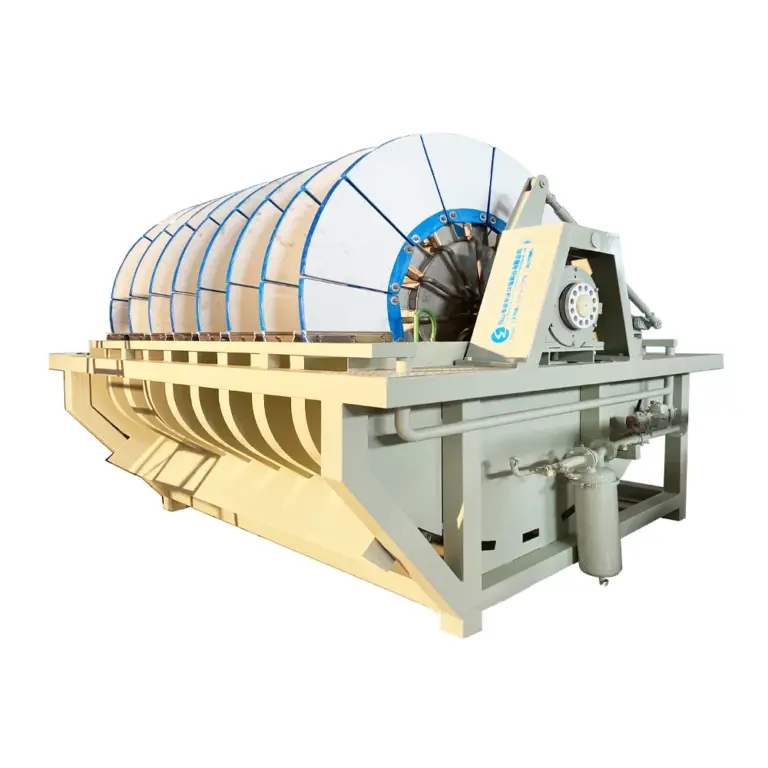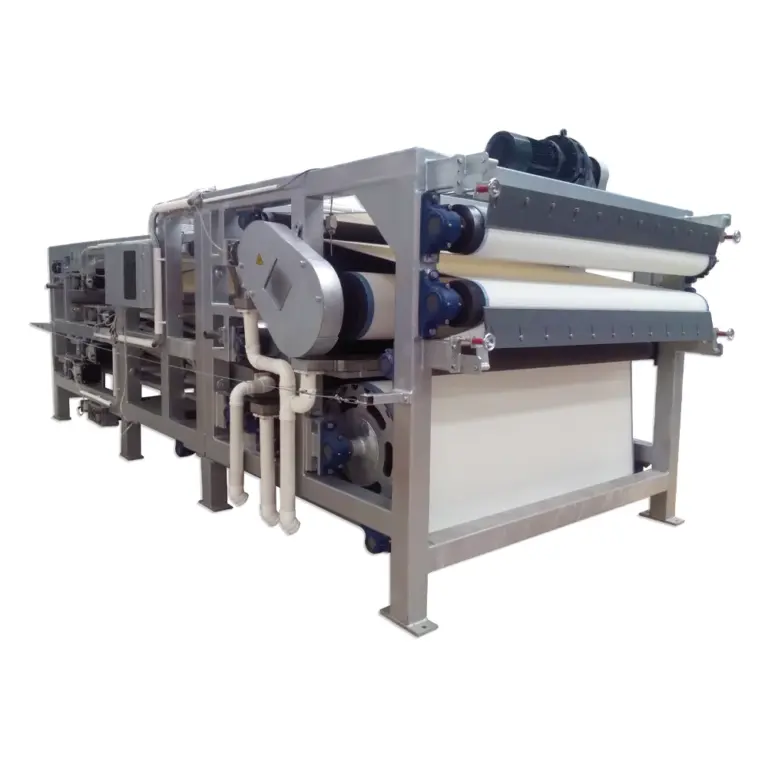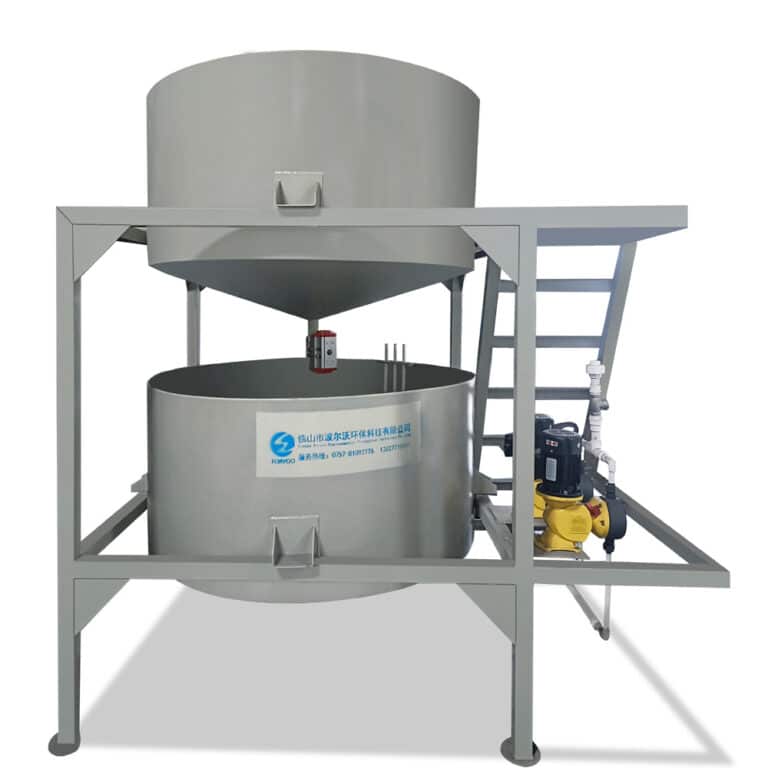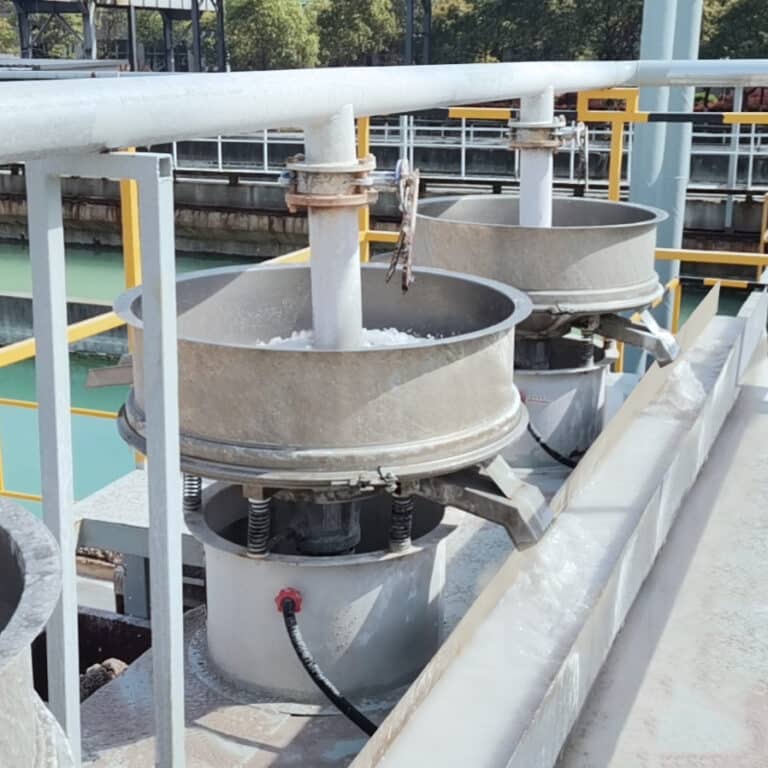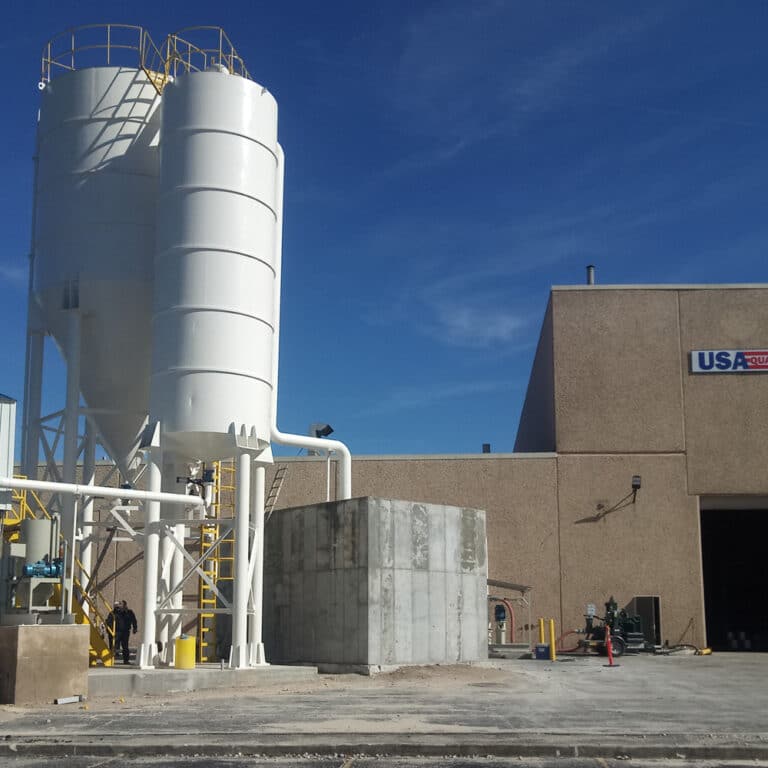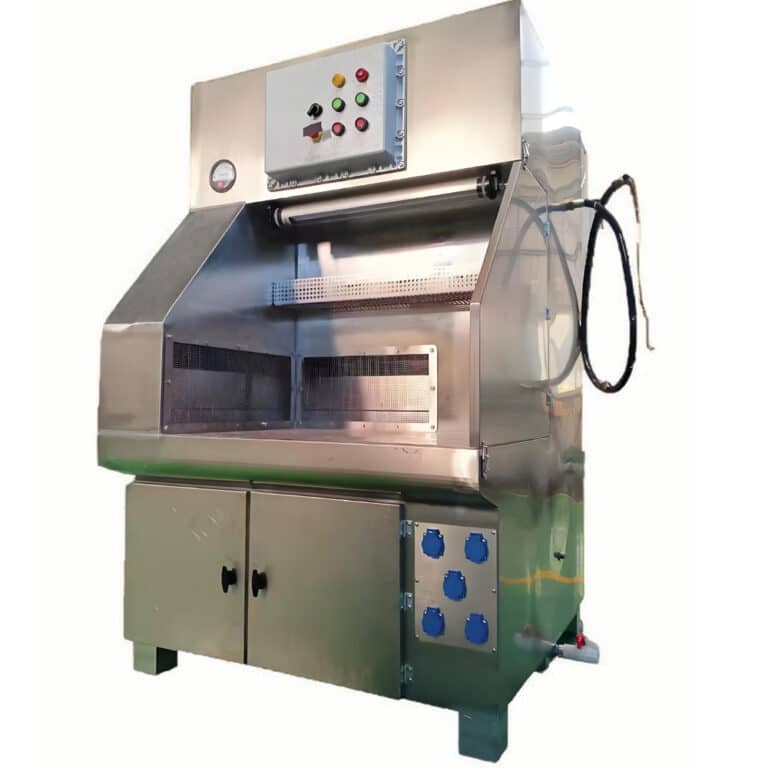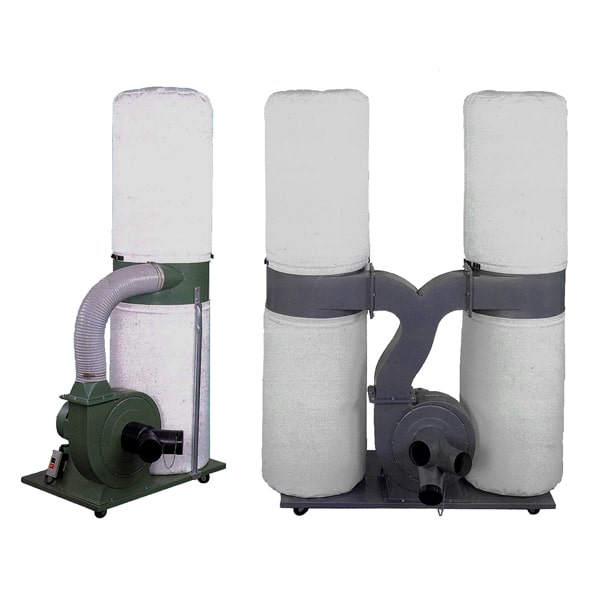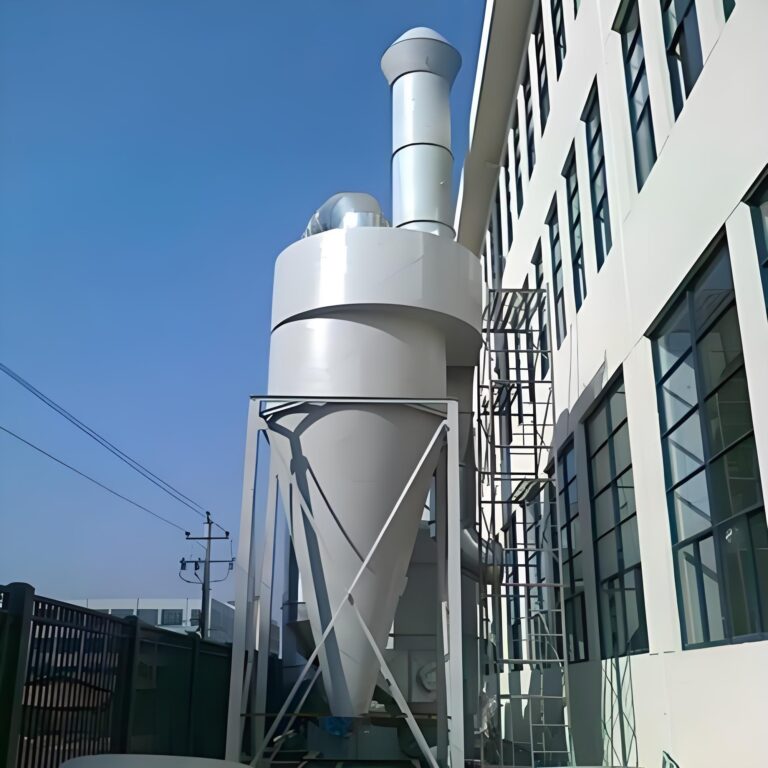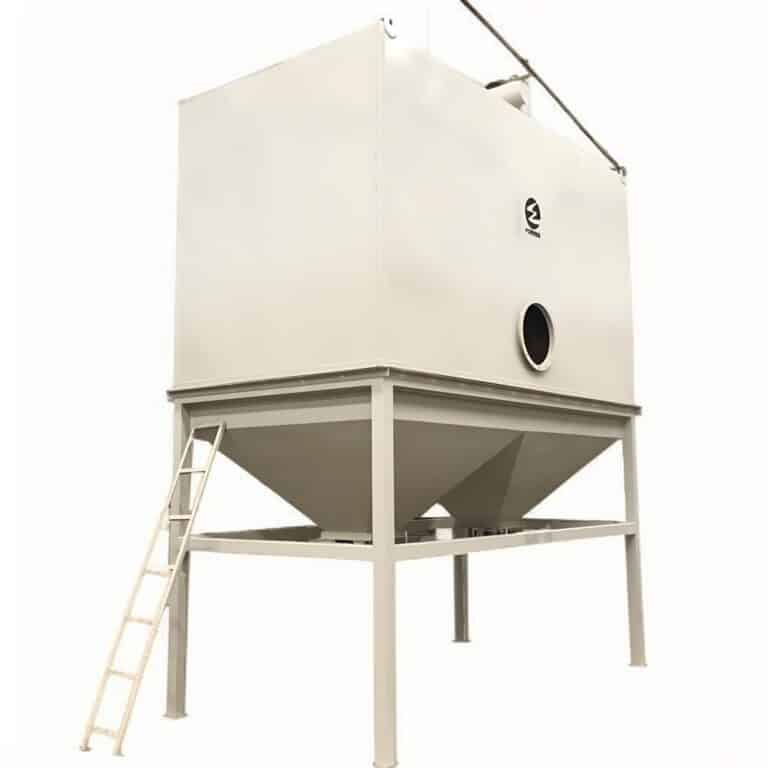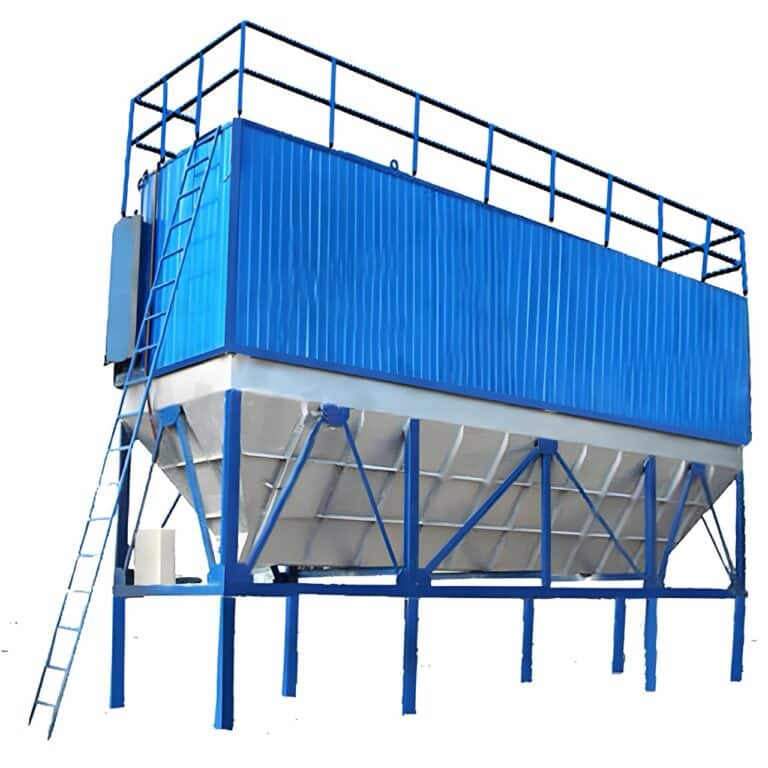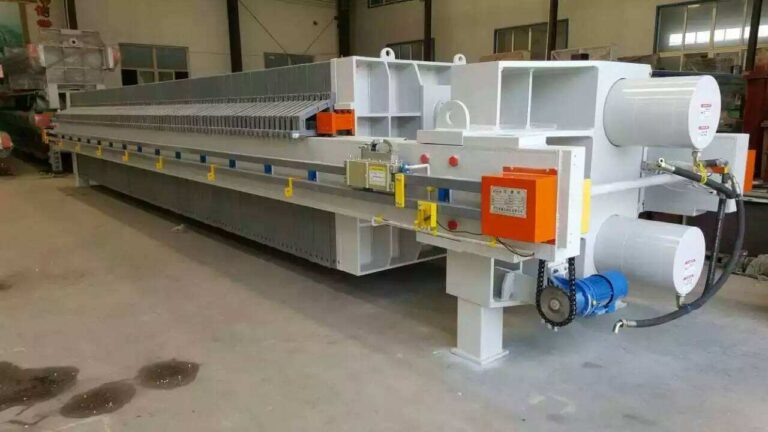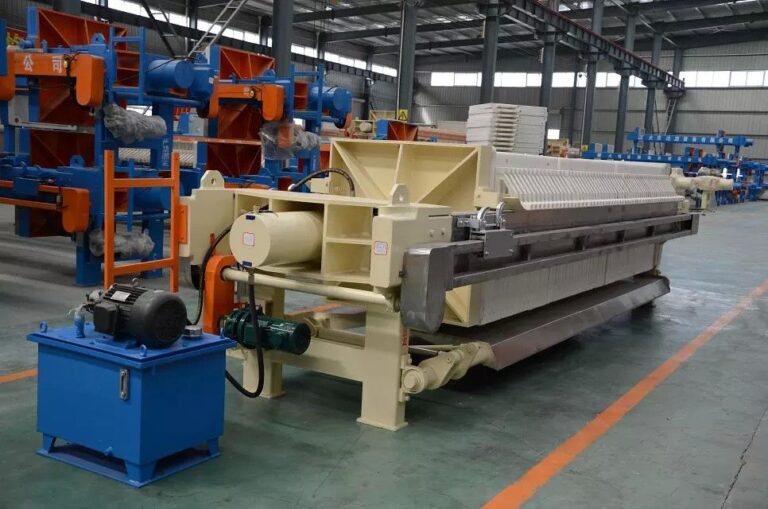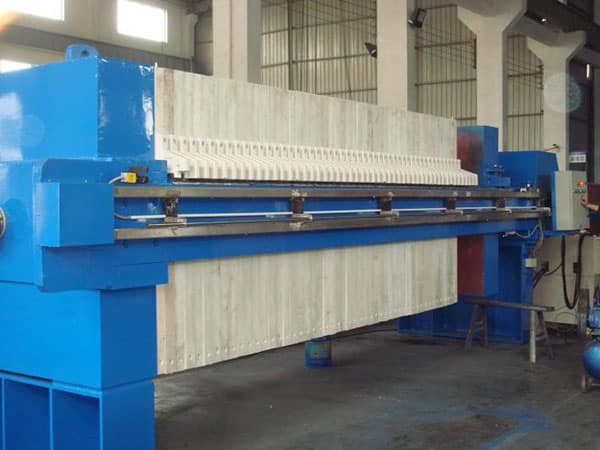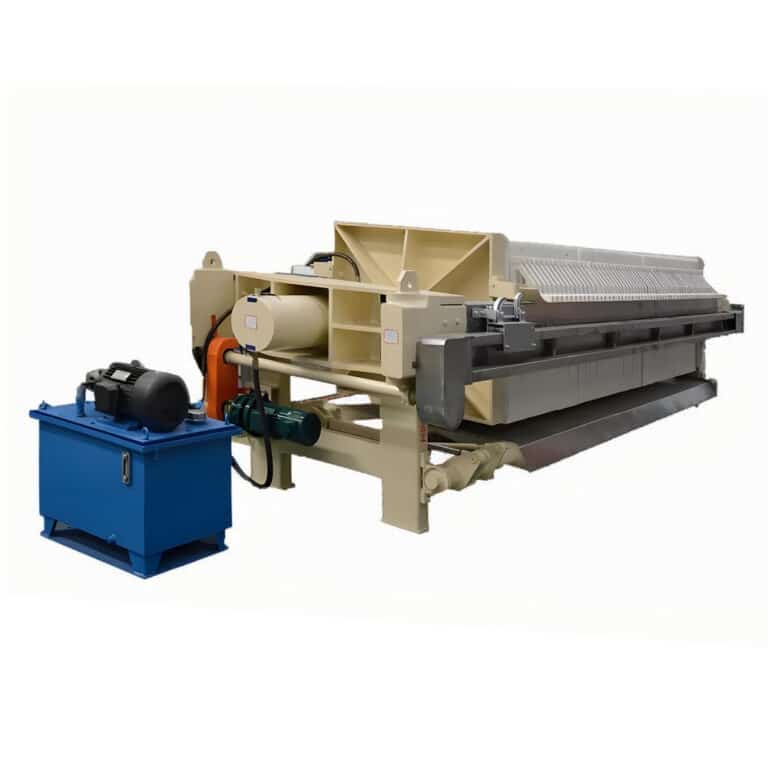Membranfilterpressen haben den Entwässerungsprozess in verschiedenen Industriezweigen revolutioniert, indem sie eine effiziente Fest-Flüssig-Trennung und eine hervorragende Klarheit des Filtrats bieten. Das Herzstück dieser fortschrittlichen Systeme ist die Steuertafel, eine entscheidende Komponente, die den gesamten Filtrationsprozess steuert. Da die Industrie zunehmend Automatisierung und Präzision in ihren Abläufen fordert, ist die Rolle der Schalttafeln für Membranfilterpressen wichtiger denn je geworden.
Die Integration hochentwickelter Steuerungen in Membranfilterpressen hat eine neue Ära der Automatisierung eingeläutet, die die betriebliche Effizienz erhöht, menschliche Fehler reduziert und die Ressourcennutzung optimiert. Diese Steuersysteme steuern alles von der anfänglichen Beschickung bis zum abschließenden Kuchenaustrag, um eine gleichbleibende Qualität zu gewährleisten und die Produktivität zu maximieren. Mit der Möglichkeit, Parameter in Echtzeit zu überwachen und anzupassen, verändern moderne Bedienfelder die Art und Weise, wie die Industrie an Filtrations- und Entwässerungsaufgaben herangeht.
Wir tauchen tiefer in die Welt der Steuerung von Membranfilterpressen ein und untersuchen die verschiedenen verfügbaren Automatisierungslösungen, die Vorteile, die sie bieten, und die technologischen Fortschritte, die diesen Bereich vorantreiben. Von einfachen Steuerungsoptionen bis hin zu vollautomatischen Systemen werden wir herausfinden, wie diese Innovationen die Zukunft der industriellen Filtrationsprozesse gestalten.
"Die Einführung fortschrittlicher Steuerungen in Membranfilterpressen hat zu einer Steigerung der Betriebseffizienz um 30% und zu einer Senkung des Energieverbrauchs um 25% in verschiedenen industriellen Anwendungen geführt."
Was sind die Hauptbestandteile eines Membranfilterpressen-Schaltschranks?
Das Herzstück jeder effizienten Membranfilterpresse ist ein hochentwickeltes Bedienfeld. Diese Schalttafeln sind die Kommandozentralen, die den gesamten Filtrationsprozess steuern und für optimale Leistung und gleichbleibende Ergebnisse sorgen.
Zu den Kernkomponenten einer Membranfilterpressensteuerung gehören in der Regel eine speicherprogrammierbare Steuerung (SPS), eine Mensch-Maschine-Schnittstelle (HMI), Eingangs-/Ausgangsmodule sowie verschiedene Sensoren und Aktoren. Diese Elemente arbeiten zusammen, um jeden Aspekt des Filtrationszyklus zu überwachen und zu steuern.
Ein gut durchdachtes Bedienfeld lässt sich nahtlos in die Membranfilterpresse integrieren, liefert Echtzeitdaten und ermöglicht dem Bediener, fundierte Entscheidungen zu treffen. Die SPS dient als Gehirn des Systems, führt vorprogrammierte Sequenzen aus und reagiert auf Eingaben von Sensoren in der gesamten Presse. Die Mensch-Maschine-Schnittstelle (HMI) bietet dem Bediener eine benutzerfreundliche Oberfläche, über die er die Parameter überwachen und bei Bedarf anpassen kann.
"Es hat sich gezeigt, dass fortschrittliche Membranfilterpressen-Steuerungen die Zykluszeiten um bis zu 20% reduzieren und die Filtratqualität um 15% im Vergleich zum manuellen Betrieb verbessern."
| Komponente | Funktion | Auswirkungen auf die Effizienz |
|---|---|---|
| PLC | Prozesssteuerung und Automatisierung | 30% Erhöhung der Arbeitsgeschwindigkeit |
| HMI | Benutzeroberfläche und Datenvisualisierung | 25% Reduzierung der Bedienerfehler |
| E/A-Module | Signalverarbeitung und Kommunikation | 40% schnellere Reaktion auf Systemänderungen |
| Sensoren | Datenerfassung in Echtzeit | 35% Verbesserung der Prozessoptimierung |
Zusammenfassend lässt sich sagen, dass die Kernkomponenten einer Membranfilterpressensteuerung ein ausgeklügeltes Ökosystem bilden, das für Effizienz, Präzision und Zuverlässigkeit im Filtrationsprozess sorgt. Durch den Einsatz dieser fortschrittlichen Technologien kann die Industrie hervorragende Ergebnisse erzielen und gleichzeitig den Ressourcenverbrauch und menschliche Fehler minimieren.
Wie verbessert die Automatisierung den Betrieb von Membranfilterpressen?
Die Automatisierung hat sich im Bereich der Membranfilterpressen zu einem entscheidenden Faktor entwickelt und verwandelt herkömmliche manuelle Prozesse in rationalisierte, effiziente Systeme. Durch die Integration fortschrittlicher Bedienfelder und Automatisierungslösungen kann die Industrie einen deutlichen Sprung in der Produktivität und Qualitätskontrolle verzeichnen.
Die Einführung der Automatisierung bei Membranfilterpressen hat zu einem gleichmäßigeren und zuverlässigeren Betrieb geführt. Mit hochentwickelten Algorithmen ausgestattete Schalttafeln können Parameter in Echtzeit anpassen, um auf Schwankungen der Beschickungsmerkmale zu reagieren und eine optimale Filtrationsleistung zu gewährleisten. Dieses Maß an Präzision ist mit manuellen Steuerungen allein fast unmöglich zu erreichen.
Automatisierte Systeme tragen auch zu mehr Sicherheit und geringeren Arbeitskosten bei. Durch die Minimierung der Notwendigkeit menschlicher Eingriffe, insbesondere in gefährlichen Umgebungen, können Unternehmen ihre Mitarbeiter schützen und gleichzeitig einen kontinuierlichen Betrieb aufrechterhalten. Außerdem ermöglicht die Automatisierung einen 24/7-Betrieb ohne Ermüdung, was zu einem höheren Durchsatz und einer besseren Nutzung der Ressourcen führt.
"Es hat sich gezeigt, dass die Implementierung vollautomatischer Steuerungssysteme in Membranfilterpressen die Gesamtanlageneffektivität (OEE) um bis zu 40% erhöhen und die Betriebskosten um 25% in großindustriellen Anwendungen senken kann."
| Merkmal Automatisierung | Nutzen Sie | Auswirkungen auf den Betrieb |
|---|---|---|
| Anpassungen in Echtzeit | Gleichbleibende Filtratqualität | 30% Verringerung der Qualitätsabweichungen |
| Fernüberwachung | Verbesserte operative Aufsicht | 50% Verringerung der Ausfallzeiten |
| Vorausschauende Wartung | Weniger ungeplante Stillstände | 35% erhöht die Lebensdauer der Geräte |
| Datenerfassung und -analyse | Verbesserte Prozessoptimierung | 20% Verbesserung der Ressourceneffizienz |
Zusammenfassend lässt sich sagen, dass die Automatisierung von Membranfilterpressen eine Vielzahl von Vorteilen bietet, die weit über einfache Bequemlichkeit hinausgehen. Von verbesserter Qualitätskontrolle bis hin zu erhöhter Sicherheit und Effizienz setzen automatisierte Systeme neue Standards in industriellen Filtrationsprozessen. Mit der Weiterentwicklung der Technologie ist zu erwarten, dass noch ausgefeiltere Automatisierungslösungen auf den Markt kommen, die den Bereich der Membranfiltration weiter revolutionieren werden.
Was sind die wichtigsten Merkmale einer modernen Steuertafel für Membranfilterpressen?
Moderne Bedienfelder für Membranfilterpressen sind mit einer Reihe von hochentwickelten Funktionen ausgestattet, die die Leistung optimieren, die Benutzerfreundlichkeit verbessern und eine umfassende Kontrolle über den Filtrationsprozess ermöglichen. Diese hochmodernen Systeme stellen die Spitze der Filtrationstechnologie dar und bieten unvergleichliche Präzision und Effizienz.
Eines der herausragenden Merkmale moderner Bedienfelder ist ihre intuitive Benutzeroberfläche. Hochauflösende Touchscreens mit grafischen Anzeigen ermöglichen dem Bediener die einfache Überwachung und Steuerung verschiedener Aspekte des Filtrationsprozesses. Diese Schnittstellen umfassen häufig eine Echtzeit-Visualisierung des Filtrationszyklus, der Druckmesswerte und der Filtratqualitätsmetriken, so dass die Bediener schnell fundierte Entscheidungen treffen können.
Ein weiteres wichtiges Merkmal ist die Integration von fortschrittlichen Datenanalyse- und Berichtsfunktionen. Diese Systeme können große Mengen an Betriebsdaten sammeln und analysieren und so Erkenntnisse liefern, die zu Prozessverbesserungen und vorausschauender Wartung führen können. Einige Bedienfelder bieten sogar eine Cloud-Konnektivität, die eine Fernüberwachung und -steuerung ermöglicht, was besonders für große Betriebe oder Anlagen mit mehreren Filterpressen von Vorteil ist.
"Es wurde festgestellt, dass fortschrittliche Bedienfelder mit vorausschauenden Wartungsfunktionen unerwartete Ausfallzeiten um bis zu 50% reduzieren und die Lebensdauer von Membranfilterpressen um 30% verlängern können."
| Merkmal | Funktion | Operative Auswirkungen |
|---|---|---|
| Touchscreen-HMI | Benutzerfreundliche Schnittstelle | 40% Verkürzung der Bedienerschulungszeit |
| Datenanalytik | Prozessoptimierung | 25% Verbesserung der Ressourcennutzung |
| Fernzugriff | Überwachung und Kontrolle außerhalb des Standorts | 60% schnellere Reaktion auf kritische Probleme |
| Automatisierte Berichterstattung | Einhaltung der Vorschriften und Leistungsverfolgung | 35% Verringerung des Verwaltungsaufwands |
Zusammenfassend lässt sich sagen, dass die wichtigsten Merkmale moderner Bedienfelder für Membranfilterpressen darauf ausgelegt sind, die Effizienz zu maximieren, Fehler zu minimieren und den Bedienern eine noch nie dagewesene Kontrolle über den Filtrationsprozess zu ermöglichen. Mit der Weiterentwicklung dieser Technologien können wir noch mehr innovative Funktionen erwarten, die die Leistung und Zuverlässigkeit des Betriebs von Membranfilterpressen weiter verbessern werden.
Wie tragen Schalttafeln zur Energieeffizienz von Membranfilterpressen bei?
Energieeffizienz ist in der Industrie zu einem wichtigen Thema geworden, und Membranfilterpressen bilden dabei keine Ausnahme. Moderne Schalttafeln spielen eine entscheidende Rolle bei der Optimierung des Energieverbrauchs und leisten einen wichtigen Beitrag zu Kosteneinsparungen und Umweltverträglichkeit.
Moderne Schalttafeln für Membranfilterpressen sind mit hochentwickelten Energiemanagementsystemen ausgestattet. Diese Systeme überwachen kontinuierlich den Stromverbrauch der verschiedenen Komponenten der Presse und passen den Betrieb an, um die Energieverschwendung zu minimieren. So können beispielsweise frequenzvariable Antriebe (VFDs), die von der Schalttafel gesteuert werden, die Pumpendrehzahlen auf der Grundlage der aktuellen Filtrationsanforderungen modulieren und so unnötige Energieausgaben vermeiden.
Darüber hinaus können intelligente Steuerungsalgorithmen, die in diese Panels implementiert sind, den Filtrationszyklus optimieren und so den Gesamtenergiebedarf pro Charge senken. Durch die präzise Steuerung von Parametern wie Druck, Durchflussmenge und Zyklusdauer stellt das System sicher, dass die Energie während des gesamten Prozesses effizient genutzt wird.
"Die Implementierung energieeffizienter Steuerungen in Membranfilterpressen hat zu einer durchschnittlichen Senkung des Energieverbrauchs um 35% geführt, was zu erheblichen Kosteneinsparungen und einer geringeren CO2-Bilanz für die industriellen Nutzer führt."
| Energiesparende Funktion | Mechanismus | Energieeinsparung |
|---|---|---|
| VFD-Integration | Adaptive Pumpendrehzahlregelung | 20-30% |
| Zyklus-Optimierung | Intelligente, auf Algorithmen basierende Anpassungen | 15-25% |
| Verwaltung des Leerlaufs | Automatische Abschaltung nicht notwendiger Komponenten | 10-15% |
| Systeme zur Wärmerückgewinnung | Nutzung von Abwärme | 5-10% |
Zusammenfassend lässt sich sagen, dass Schalttafeln entscheidend zur Steigerung der Energieeffizienz im Betrieb von Membranfilterpressen beitragen. Durch den Einsatz fortschrittlicher Technologien und intelligenter Algorithmen senken diese Systeme nicht nur den Energieverbrauch, sondern tragen auch zu nachhaltigeren industriellen Verfahren bei. Da die Energiekosten weiter steigen und die Umweltvorschriften immer strenger werden, wird die Bedeutung energieeffizienter Steuerungen in der Membranfiltration weiter zunehmen.
Welche Rolle spielt das Datenmanagement in modernen Membranfilterpressen-Steuerungen?
Im Zeitalter von Industrie 4.0 ist das Datenmanagement zu einem Eckpfeiler effizienter und intelligenter Fertigungsprozesse geworden. Moderne Bedienfelder für Membranfilterpressen stehen an der Spitze dieser Datenrevolution und bieten beispiellose Möglichkeiten der Datenerfassung, -analyse und -nutzung.
Moderne Bedienfelder sind mit robusten Datenverwaltungssystemen ausgestattet, die kontinuierlich Betriebsdaten von verschiedenen Sensoren und Komponenten der Membranfilterpresse erfassen und speichern. Zu diesen Daten gehören Parameter wie Druck, Durchflussmenge, Filtratqualität, Zykluszeiten und Energieverbrauch. Die Möglichkeit, diese Informationen in Echtzeit zu erfassen und zu speichern, bietet eine Fülle von Einblicken in den Filtrationsprozess.
Doch die wahre Stärke der Datenverwaltung in modernen Bedienfeldern liegt in ihren analytischen Fähigkeiten. Diese Systeme setzen hochentwickelte Algorithmen und maschinelle Lernverfahren ein, um die erfassten Daten zu analysieren und Muster, Trends und Anomalien zu erkennen, die für menschliche Bediener möglicherweise nicht erkennbar sind. Diese Analyse kann zu Prozessoptimierungen, vorausschauenden Wartungsstrategien und einer kontinuierlichen Verbesserung der Filtrationseffizienz führen.
"Membranfilterpressen, die mit fortschrittlichen Datenmanagementsystemen ausgestattet sind, haben eine Verbesserung der Gesamteffizienz des Prozesses um 40% und eine Senkung der Wartungskosten um 30% durch vorausschauende Analysen und Optimierung gezeigt."
| Merkmal der Datenverwaltung | Funktion | Operativer Nutzen |
|---|---|---|
| Datenerfassung in Echtzeit | Kontinuierliche Überwachung aller Prozessparameter | 50% schnellere Reaktion auf Prozessabweichungen |
| Analyse historischer Daten | Identifizierung von langfristigen Trends und Mustern | 35% Verbesserung der Prozessoptimierung |
| Prädiktive Analytik | Vorhersage von Wartungsbedarf und potenziellen Problemen | 45% Verringerung der ungeplanten Ausfallzeiten |
| Leistungsberichte | Automatisierte Erstellung umfassender Berichte | 60% Verringerung der manuellen Meldezeit |
Zusammenfassend lässt sich sagen, dass das Datenmanagement in modernen Membranfilterpressen-Steuerungen eine zentrale Rolle spielt, da es rohe Betriebsdaten in verwertbare Erkenntnisse umwandelt. Durch die Nutzung von Big Data und fortschrittlicher Analytik sorgen diese Systeme für ein noch nie dagewesenes Maß an Effizienz, Zuverlässigkeit und Leistung in industriellen Filtrationsprozessen. Mit der Weiterentwicklung der Datenverwaltungstechnologien können wir mit noch ausgefeilteren Funktionen rechnen, die den Bereich der Membranfiltration weiter revolutionieren werden.
Wie passen sich Schalttafeln an Industrie 4.0 und IoT-Integration an?
Die Einführung von Industrie 4.0 und dem Internet der Dinge (IoT) hat eine neue Ära der Konnektivität und Intelligenz in industriellen Prozessen eingeläutet. Schalttafeln für Membranfilterpressen stehen an der Spitze dieser technologischen Revolution und passen sich schnell an, um diese hochmodernen Konzepte und Technologien zu integrieren.
Moderne Schalttafeln sind zunehmend mit IoT-Funktionen ausgestattet, sodass sie sich nahtlos mit anderen Systemen und Geräten innerhalb eines Produktionsökosystems verbinden lassen. Diese Interkonnektivität ermöglicht den Datenaustausch in Echtzeit, die Fernüberwachung und die zentrale Steuerung mehrerer Filterpressen an verschiedenen Standorten. IoT-fähige Bedienfelder können mit ERP-Systemen (Enterprise Resource Planning), Wartungsmanagementsoftware und sogar Lieferkettenplattformen kommunizieren und so eine vollständig integrierte und intelligente Produktionsumgebung schaffen.
Darüber hinaus treiben die Grundsätze der Industrie 4.0 die Entwicklung von adaptiven und selbstoptimierenden Steuerungssystemen voran. Diese fortschrittlichen Panels können maschinelle Lernalgorithmen nutzen, um Filtrationsprozesse kontinuierlich zu verbessern, sich an veränderte Bedingungen anzupassen und die Leistung ohne menschliches Eingreifen zu optimieren. Dieses Maß an Autonomie steigert nicht nur die Effizienz, sondern ermöglicht auch flexiblere und reaktionsschnellere Produktionsabläufe.
"Membranfilterpressen mit Industrie 4.0-kompatiblen Bedienfeldern haben im Vergleich zu herkömmlichen Systemen eine um 50% höhere Gesamtproduktivität und eine um 40% geringere Anzahl an qualitätsbezogenen Problemen gezeigt."
| Industrie 4.0 Merkmal | Umsetzung | Auswirkungen auf den Betrieb |
|---|---|---|
| IoT-Konnektivität | Integration mit werksweiten Systemen | 70% Verbesserung der operativen Sichtbarkeit |
| Maschinelles Lernen | Selbst-optimierende Filtrationsprozesse | 45% Steigerung der Prozesseffizienz |
| Digitale Zwillingstechnologie | Virtuelle Modellierung und Simulation | 60% schnellere Fehlersuche und Optimierung |
| Maßnahmen zur Cybersicherheit | Erweiterte Verschlüsselung und Zugriffskontrolle | 80% Reduzierung der sicherheitsrelevanten Vorfälle |
Zusammenfassend lässt sich sagen, dass sich die Bedienfelder für Membranfilterpressen rasch weiterentwickeln und die Prinzipien von Industrie 4.0 und IoT-Integration übernehmen. Diese Fortschritte verbessern nicht nur die Leistung einzelner Filterpressen, sondern transformieren ganze Produktionsökosysteme. Wenn diese Technologien weiter ausgereift sind, können wir ein noch höheres Maß an Integration, Intelligenz und Effizienz in Membranfiltrationsprozessen erwarten.
Was sind die zukünftigen Trends in der Membranfilterpressen-Schaltschranktechnik?
Der Blick in die Zukunft zeigt, dass die Technologie der Schaltschränke für Membranfilterpressen vor spannenden Entwicklungen steht. Aufkommende Trends versprechen, die Effizienz, Zuverlässigkeit und Funktionalität weiter zu verbessern und die Grenzen des Möglichen in der industriellen Filtration zu verschieben.
Einer der wichtigsten Trends am Horizont ist die Integration von künstlicher Intelligenz (KI) und maschinellen Lernfunktionen in Schalttafeln. Diese fortschrittlichen Systeme werden in der Lage sein, aus historischen Daten und Echtzeit-Eingaben zu lernen und prädiktive Entscheidungen zu treffen, die Filtrationsprozesse mit minimalem menschlichen Eingriff optimieren. KI-gestützte Schalttafeln könnten möglicherweise den Wartungsbedarf vorhersehen, Parameter proaktiv an sich ändernde Futtermittelmerkmale anpassen und sogar Prozessverbesserungen auf der Grundlage komplexer Datenanalysen vorschlagen.
Ein weiterer neuer Trend ist die Entwicklung modularer und skalierbarer Kontrollsysteme. Künftige Schalttafeln werden wahrscheinlich mit Plug-and-Play-Komponenten ausgestattet sein, die einfache Upgrades und Anpassungen ermöglichen. Diese Flexibilität wird es den Herstellern ermöglichen, ihre Filtersysteme schnell an veränderte Produktionsanforderungen oder technologische Fortschritte anzupassen, ohne dass ein komplettes System überholt werden muss.
"Branchenexperten gehen davon aus, dass KI-gestützte Bedienfelder für Membranfilterpressen die betriebliche Gesamteffizienz um bis zu 60% verbessern und den Abfall um 40% reduzieren könnten, verglichen mit den derzeitigen fortschrittlichen Systemen."
| Zukünftiger Trend | Potenzielle Auswirkungen | Voraussichtlicher Zeitplan |
|---|---|---|
| KI-Integration | 60% Steigerung der betrieblichen Effizienz | 3-5 Jahre |
| Modularer Aufbau | 50% Reduzierung der Aufrüstungskosten | 2-3 Jahre |
| Augmented-Reality-Schnittstellen | 70% Verbesserung der Wartungseffizienz | 4-6 Jahre |
| Integration von Quantencomputern | 80% schnellere komplexe Berechnungen | 7-10 Jahre |
Zusammenfassend lässt sich sagen, dass die Zukunft der Schaltschranktechnologie für Membranfilterpressen rosig und voller Potenzial ist. Von KI-gesteuerter Optimierung über modulare Designs bis hin zu hochmodernen Schnittstellen versprechen diese Fortschritte eine Revolutionierung der industriellen Filtrationsprozesse. Wenn diese Technologien ausgereift und leichter zugänglich sind, können wir in verschiedenen Branchen, die auf Membranfiltration angewiesen sind, erhebliche Verbesserungen in Bezug auf Effizienz, Nachhaltigkeit und Gesamtleistung erwarten.
Schlussfolgerung
Die Entwicklung von Bedienfeldern für Membranfilterpressen stellt einen bedeutenden Sprung in der industriellen Filtrationstechnologie dar. Von der Verbesserung der Betriebseffizienz über die Senkung des Energieverbrauchs bis hin zur Integration von Industrie 4.0-Prinzipien - diese fortschrittlichen Systeme verändern die Landschaft der Fest-Flüssig-Trennverfahren in verschiedenen Branchen.
Wie wir in diesem Artikel erläutert haben, bieten moderne Bedienfelder eine Vielzahl von Vorteilen, darunter Prozessoptimierung in Echtzeit, vorausschauende Wartungsfunktionen und nahtlose Integration in IoT-Ökosysteme. Die Einbindung hochentwickelter Datenmanagement- und Analysetools hat neue Möglichkeiten für kontinuierliche Verbesserungen und betriebliche Exzellenz eröffnet.
Der Blick in die Zukunft zeigt, dass die Zukunft der Membranfilterpressen-Steuerungen voller Potenzial ist. Aufkommende Technologien wie künstliche Intelligenz, modulare Designs und Augmented-Reality-Schnittstellen versprechen eine weitere Revolution in diesem Bereich und bieten ein noch nie dagewesenes Maß an Effizienz, Flexibilität und Intelligenz.
Für Industrien, die an der Spitze der Filtrationstechnologie bleiben wollen, ist die Investition in fortschrittliche Schalttafeln nicht länger ein Luxus, sondern eine Notwendigkeit. Unternehmen wie PORVOO sind führend in der Entwicklung von Spitzenlösungen, die den sich wandelnden Anforderungen moderner Industrieprozesse gerecht werden. Ihr Bedienfeld für Membranfilterpresse ist ein Beispiel für die neuesten Entwicklungen in diesem Bereich und bietet eine perfekte Mischung aus Innovation und Zuverlässigkeit.
Es liegt auf der Hand, dass die Bedeutung von Schalttafeln im Betrieb von Membranfilterpressen weiter zunehmen wird. Durch die Nutzung dieser technologischen Fortschritte kann die Industrie nicht nur ihre aktuellen Prozesse verbessern, sondern sich auch für den zukünftigen Erfolg in einem zunehmend wettbewerbsorientierten und umweltbewussten Markt positionieren.
Externe Ressourcen
Membranfilterpresse - Filterpresse Hersteller-China Uniwin - Auf dieser Seite finden Sie ausführliche Informationen über die Komponenten und das Funktionsprinzip einer Membranfilterpresse, einschließlich des Steuerpults, des Hydraulikzylinders und der Hydraulikstation.
Steuerungsoptionen für Filterpressen - M.W. Watermark - Diese Ressource beschreibt verschiedene Steuerungsoptionen für Filterpressen, einschließlich des Automatic Feed Pump Control System (AFPCS), Single Stage Feed Pump Control (SSFPC) und Full Automation Control System (FACS), die für das Bedienfeld einer Membranfilterpresse relevant sind.
Membranquetschfilterpressen und Filterplatten - M.W. Watermark - In diesem Artikel wird der Prozess von Membranquetschfilterpressen erklärt, einschließlich der Rolle der Steuertafel bei der Steuerung des Hydraulikzylinders, des Beschickungsvorgangs und des Membranquetschens.
Neue und gebrauchte Filterpressen - Met-Chem - Diese Seite konzentriert sich zwar in erster Linie auf neue und gebrauchte Filterpressen, erwähnt aber auch die verschiedenen verfügbaren Steuerungssysteme und Automatisierungsoptionen, die für das Verständnis der Anforderungen an die Steuerung einer Membranfilterpresse von Bedeutung sein können.
Filterpressen-Automatisierung - JWI - Diese Ressource befasst sich mit den Automatisierungssystemen, einschließlich der Schalttafeln, für Filterpressen und zeigt auf, wie diese Systeme die Effizienz und den Betrieb verbessern.
Membranfilterpressen - ANDRITZ - ANDRITZ bietet detaillierte technische Informationen zu seinen Membranfilterpressen, einschließlich der Steuerungssysteme und Panels, die den Filtrations- und Entwässerungsprozess steuern.
Steuerungssysteme für Filterpressen - Evoqua - Die Ressourcen von Evoqua umfassen fortschrittliche Steuersysteme für Filterpressen, einschließlich automatisierter Bedienfelder zur Optimierung des Filtrationszyklus.
Automatisierte Filterpressensysteme - Micronics - Micronics bietet automatisierte Filterpressensysteme an, und ihre Ressourcen umfassen Informationen über die Bedienfelder und Automatisierungsoptionen, die den Betrieb von Membranfilterpressen rationalisieren.
